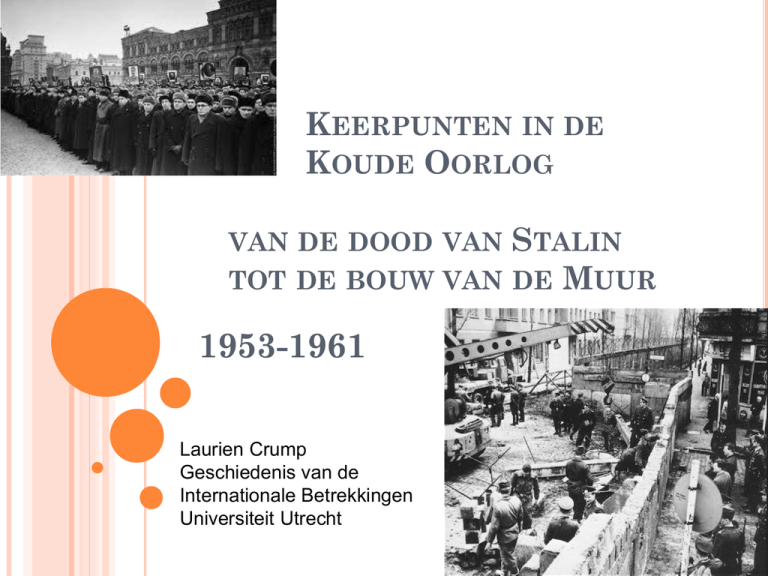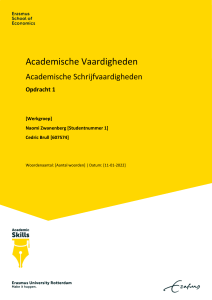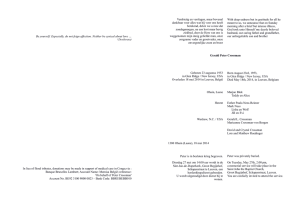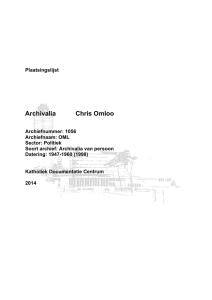ppt lezing Laurien Crump Keerpunten in de Koude Oorlog
advertisement

KEERPUNTEN IN DE KOUDE OORLOG VAN DE DOOD VAN STALIN TOT DE BOUW VAN DE MUUR 1953-1961 Laurien Crump Geschiedenis van de Internationale Betrekkingen Universiteit Utrecht 1953: ‘DE NIEUWE KOERS’ ONTSPOORD? Na de dood van Stalin in maart 1953: Collectieve partijleiding i.p.v. persoonlijkheidscultus ‘De nieuwe koers’ van de SU: retoriek of realiteit? Hervormingen in Oost-Europese landen Juni 1953: opstanden in Oost-Berlijn en de DDR http://digitalarchive.wilsoncenter.org/collections http://digitalarchive.wilsoncenter.org/document/113100 Wie is verantwoordelijk? Triomf van Ulbricht of van het Kremlin? De ‘Duitse kwestie’ op scherp JUNE 02, 1953 OTTO GROTEWOHL’S NOTES ON MEETINGS BETWEEN EAST GERMAN AND SOVIET LEADERS IN MOSCOW 1955: EEN NIEUWE BUITENLANDPOLITIEK Mei 1955: Toetreding BRD tot de NAVO 14 mei 1955: Oprichting van het Warschaupact (gemodelleerd naar Noord-Atlantisch verdrag) http://www.php.isn.ethz.ch/collections/colltopic.cfm?lng=en&id=14465 http://www.php.isn.ethz.ch/collections/coll_pcc/wapa_treaty.cfm vgl. http://www.nato.int/cps/en/natolive/official_texts_17120.htm Politiek of militair? Communistisch? Bondgenootschap of ‘cardboard castle’? 15 mei 1955: Neutraliteit Oostenrijk 25 mei 1955: verzoening met Tito Sovjet troepen worden gereduceerd ‘Paradigm shift’ in buitenlandbeleid CHROESJTSJOVS GEHEIME TOESPRAAK: PR OF NIEUWE POLITIEK? Januari 1956: eerste Warschaupactvergadering Nieuwe doctrine: initiatief voor Oost-Europese landen Februari 1956: Chroesjtsjovs ‘geheime toespraak’ http://digitalarchive.wilsoncenter.org/document/115995 Vreedzame co-existentie en einde persoonlijkheidscultus Het vacuüm van de destalinisatie De gevolgen voor de relaties met China De Oost-Europese volkeren KHRUSHCHEV'S "SECRET SPEECH," DELIVERED AT THE TWENTIETH PARTY CONGRESS OF THE COMMUNIST PARTY OF THE SOVIET UNION, FEBRUARY 25, 1956 Vladimir Ilyich said: "Stalin is excessively rude, and this defect, which can be freely tolerated in our midst and in contacts among us Communists, becomes a defect which cannot be tolerated in one holding the position of the Secretary General. Because of this, I propose that the comrades consider the method by which Stalin would be removed from this position and by which another man would be selected for it, a man, who above all, would differ from Stalin in only one quality, namely, greater tolerance, greater loyalty, greater kindness, and more considerate attitude toward the comrades, a less capricious temper, etc.” DE IRONIE VAN LIBERALISERINGEN: POLEN EN HONGARIJE IN 1956 Oktober 1956: Chroesjtsjov vs. Gomulka Okt./Nov. 1956: Poolse echo’s in Hongarije Verklaring 30 oktober 1956 http://digitalarchive.wilsoncenter.org/document/113647 Waarin gaan de Hongaren te ver? (Tweede) invasie: 4 november 1956 Kremlin: doortastend of verward? Unilateraal of multilateraal? Geopolitieke omstandigheden? Rol van de Chinezen? Rol van het Warschaupact? WORKING NOTES FROM THE SESSION OF THE CPSU CC PRESIDIUM ON 30 OCTOBER 1956 Khrushchev: We should adopt a declaration today on the withdrawal of troops from the countries of people's democracy (and consider these matters at a session of the Warsaw Pact), taking account of the views of the countries in which our troops are based. The entire CPC CC Politburo supports this position. Bulganin: The Chinese cdes. have an incorrect impression of our relations with the countries of people's democracy. 1958-1959: CHROESJTSJOV OP DRIFT? 1958: Warschaupact vergadering over troepenverminderingen Terugtrekking troepen uit Roemenië 27 november 1958: ultimatum over Berlijn 1959: bezoek aan VS (daarna pas China) ‘The spirit of Camp David’vs. Sino-Sovjet schisma De vooravond van de jaren zestig: (ont)spanning? http://digitalarchive.wilsoncenter.org/document/118893 DECEMBER, 1959 MAO ZEDONG, OUTLINE FOR A SPEECH ON THE INTERNATIONAL SITUATION Khrushchev and his group are very naïve. He does not understand Marxism- Leninism and is easily fooled by imperialism. He does not understand China, to an extreme extent. He doesn’t research [China] and believes a whole bunch of incorrect information. He gives irresponsible talks. If he doesn’t correct [his mistakes], in a few years he’ll be completely bankrupt (after 8 years). He panics over China. The panic has reached its extreme. He has two main fears: imperialism and Chinese Communism. DE DUITSE KWESTIE WEDEROM OP SCHERP 1961: Aantal vluchtelingen uit DDR neemt toe Juni 1961: mislukte top met Kennedy http://digitalarchive.wilsoncenter.org/collection/156/berlin-wall http://digitalarchive.wilsoncenter.org/document/110206 Chroestjsov staat onder druk van Ulbricht 3-5 Augustus WP top: Gomulka vs. Ulbricht Conclusie: wel grenzen afsluiten, geen vredesverdrag 13 aug. 1961: bouw van de muur, met WP goedkeuring Kennedy: ‘A wall is a hell of a lot better than a war.’ Consolidatie van de Koude Oorlog? Duitse kwestie bezegeld? Sino-Sovjet schisma onomkeerbaar? NOTES ON THE CONVERSATION OF COMRADE N.S. KHRUSHCHEV WITH COMRADE W. ULBRICHT ON 1 AUGUST 1961 N. S. Khrushchev: I have a technical question. How will the border control be realized on streets in which one side is in the GDR and the other is in West Berlin? W. Ulbricht: We have a specific plan. In houses with exits into West Berlin, they will be walled up. In other places, barbed wire barriers will be erected. The barbed wire has already been delivered. It can all happen very quickly. It will be harder with transportation routes. We will the reconstruct the train platforms of the city trains (S-bahn) and underground trains (U-bahn) that go to West Berlin.


